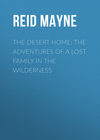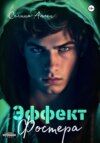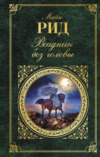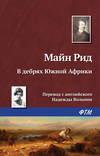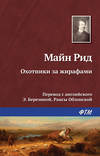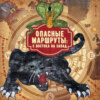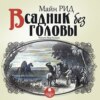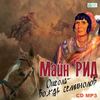Читать книгу: «The Desert Home: The Adventures of a Lost Family in the Wilderness», страница 16
“For myself, I could not see clearly how this difficulty was to be got over – as the woods beyond D and E were thick and tangled. The thing was no puzzle to Cudjo, however. He knew a way of finding B, and the bee-tree as well, and he went about it at once.
“Placing one of the boys at the station A, so that he could see him over the grass, he shouldered his axe, and moved off along the line A D. He entered the woods at D, and kept on until he had found a tree from which both A and D were visible, and which lay exactly in the same line. This tree he ‘blazed.’ He then moved a little farther, and blazed another, and another – all on the continuation of the line A D – until we could hear him chopping away at a good distance in the woods. Presently he returned to the point E; and, calling to one of us to stand for a moment at C, he commenced ‘blazing’ backwards, on the continuation of C E. We now joined him – as our presence at the logs was no longer necessary to his operations.
“At a distance of about two hundred yards from the edge of the glade, the blazed lines were seen to approach each other. There were several very large trees at this point. Cudjo’s ‘instinct’ told him, that in one of these the bees had their nest. He flung down his axe at length, and rolled his eyes upwards. We all took part in the search, and gazed up, trying to discover the little insects that, no doubt, were winging their way among the high branches.
“In a few moments, however, a loud and joyful exclamation from Cudjo proclaimed that the hunt was over —the bee-tree was found!
“True enough, there was the nest, or the entrance that led to it, away high up on a giant sycamore. We could see the discoloration on the bark caused by the feet of the bees, and even the little creatures themselves crowding out and in. It was a large tree, with a cavity at the bottom big enough to have admitted a full-sized man, and, no doubt, hollow up to the place where the bees had constructed their nest.
“As we had spent many hours in finding it, and the day was now well advanced, we concluded to leave farther operations for the morrow, when we should fell it, and procure the delicious honey. With this determination, and well satisfied with our day’s amusement, we returned to our house.”
Chapter Thirty Five.
A Rival Honey-Robber
“Now, there were some circumstances to be considered, before we could proceed any farther in the matter of the bees. How were we to get at the honey? ‘Why, by felling the tree, and splitting it open, of course,’ you will say. Well, that would have to be done, too; but there was still another consideration. It is no very difficult matter to fell a tree, and split it up – that is, when one has a good axe – but it is a very different affair to take the honey-combs from some eight or ten thousand bees, every one of them with a sharp sting in his tail. We had no brimstone; and if we had had such a thing, they were well out of the reach of it, while the tree stood; and after it should be felled, we could not approach them. They would then be furious to a certainty.
“But Cudjo’s knowledge of bee-hunting extended farther than to the mere finding of the tree. He knew, also, how to humbug the bees, and rob them of their sweet honey. That was a part of the performance that Cudjo understood as well as any other. According to his directions, then, two pairs of stout buckskin gloves were prepared. We chanced to have one pair already, and Mary soon stitched up a second, of the kind generally used for weeding thistles – that is, having only a thumb, and a place for all the fingers together. One pair of the gloves Cudjo intended to use himself – the other was for me. Of course, the rest were to take no part in the robbery, but only to stand at a safe distance and look on.
“In addition to the gloves, a couple of masks were cut out of elk-hide, and with strings fitted to our faces. These, with our thick deerskin overcoats, would protect us against the stings of all the bees in creation.
“Thus accoutred, then, or rather taking these articles along with us, we set out for the bee-tree. Of course, everybody went as usual. We took with us the axe to cut down the tree, and several vessels to hold the honey.
“On arriving at the glade, we loosed Pompo out of the cart; and picketed him as we had done the day before. It would not do to bring him any nearer the scene of action, as the bees might take a fancy to revenge themselves by stinging him. We then took our ‘fixings’ from the cart, and proceeded to the tree. In a few moments we stood by its foot.
“On looking up we observed that there was an unusual commotion among the bees. They were whirring in large numbers around the entrance of their nest, and swarming out and in. As the day was very still, we could hear them buzzing loudly. What could it mean? Were they going to hive?
“Cudjo thought not. It was too early in the season for that. And yet their actions were strange. He could not understand it.
“‘Dey look, Massa,’ said he, after gazing at them for some moments, ‘dey look zackly like some varmint war a-vexin’ ob ’em.’
“So did they, but no ‘varmint’ appeared to be near their hole; and no animal, however thick in the skin, would have ventured into it, as we thought. The orifice was not over three inches in diameter, and we knew that neither squirrel, marten, nor weasel, would have dared to put a nose into it. What, then, could have so excited them?
“We observed that it was a warm day – the warmest we had had up to that time – and, probably, the beat had set them a-going. With this explanation, therefore, in the absence of a better, we remained satisfied; and commenced making our preparations to fell the tree.
“It was not likely to be a difficult job. The tree, as I have said, was a hollow one; and near the ground its trunk was nothing but a mere shell, which we could easily cut through. So Cudjo went lustily to work with his axe; and the white sycamore chips were soon flying in every direction.
“He had hardly made a dozen strokes, when we were startled by a singular noise, that sounded something like a ‘cross’ between a growl and a snort!
“Cudjo immediately suspended his blows; and we all stood gazing at each other with looks that betokened surprise and terror. I say terror– for the noise had something terrible in it; and we knew it could have proceeded from nothing else than some large and fierce animal. Whence did it come? – from the woods? We looked anxiously around us, but no motion could be observed in the bramble. The underwood was thin, and we could have seen a large animal at some distance, had such been there.
“Again the horrid sound echoed in our ears. It appeared to issue out of the earth! No —it came out of the tree!
“‘Golly!’ exclaimed Cudjo, ‘it am a bar, Massa Roff! I know him growl.’
“‘A bear!’ I ejaculated, catching the thought at the same moment. ‘A bear in the bee-tree! Run, Mary! Run for the glade!’ – and I hurried my wife and children from the spot. Harry and Frank both wished to remain with their rifles, and I could hardly get them off. I induced them to go, at length, by telling them that they must stay near their mother and the little ones, to guard them in case the animal should come that way. All this occupied but a few seconds of time, and then Cudjo and I were left to ourselves.
“It was evident that a bear was up the hollow of the tree, and hence the flurry among the bees. Cudjo’s axe had disturbed him – he was coming down!
“What was to be done? Could we not close up the hole? No – there was nothing – we should be too late!
“I seized my rifle, while Cudjo stood by with his axe. I cocked the piece, and made ready to fire the moment his head should appear. To our astonishment, instead of a head, a shapeless mass of shaggy, black hair made its appearance, which we saw was the rump and hind-quarters of the animal. He was coming down tail-foremost – although not a bit of tail was to be seen, for he had none.
“We did not stop to examine that. I fired as soon as his hips made their appearance, and almost at the same instant Cudjo dealt them a hearty blow with his axe. It was enough to have killed him, as we thought, but to our surprise the hind-quarters suddenly disappeared. He had gone up the tree again.
“What next? – would he turn himself in the hollow, and come down head-foremost? If so, my rifle was empty, and Cudjo might miss his blow, and let him pass out.
“All at once my eye fell upon the two great deerskin coats, that were lying on the ground close by. They would be large enough, properly rolled, to fill the mouth of the cavity. I threw aside my rifle, and laid hold of them. Cudjo assisted me. In a second or two, we had gathered them into a hard ‘clump,’ and wedged them into the hole. They fitted it exactly!
“We saw blood streaming down as we stuffed in the coats. The bear was wounded. It was not likely, then, that he would trouble us for a while; and as one watched the coats, the other brought up great stones, which we piled against them, until we had made all secure.
“We now ran around the tree, looking up the trunk, to assure ourselves that there was no opening above, through which he might creep out and come down upon us. No – there was none, except the bee-hole, and that was not big enough for his nose, sharp as it was. Bruin was fairly ‘in the trap.’
“I knew that Mary and the rest would be uneasy about us; and I ran out to the glade to make known our success. The boys cheered loudly; and we all returned together to the tree, as there was now no danger – no more than if there hadn’t been a bear nearer to us than the North Pole.
“We had him safe, so that there was no fear of his escaping. But how were we to get at him? – for we had determined to take his life. Such a fierce creature as this must not be allowed to get off; as he would soon have settled with one of us, had he met us on anything like equal terms. I had thought, at first, he might be a grizzly bear, and this had terrified me the more – for the killing of one of these fierce animals with a shot is next to an impossibility. When I reflected, however, I knew it could not be this; for the ‘grizzly,’ unlike his sable cousin, is not a tree-climber. It was the black bear, then, that we had got in the tree.
“But how were we to reach him? Leave him where he was, and let him starve to death? No, that would never do. He would eat all the fine stock of honey; if, indeed, he had not done so already. Moreover, he might scrape his way out, by enlarging the bee-hole. This he could do with his great sharp claws. We must therefore adopt some other plan.
“It occurred to us that it was just probable he might be down at the bottom, poking his nose against the coats. We could not tell, for there was no longer any growling. He was either too angry, or too badly scared to growl – we could not say which. At all events, he was not uttering a sound. He might, nevertheless, be as close to us at the moment as he could get. If so, our plan would be to cut a small hole in the tree above him, so that we might reach him with a bullet from the rifle. This plan was adopted, and Cudjo set to work to make the hole.
“In a few minutes the thin shell was penetrated, and we could see into the cavity. Bruin was nowhere visible – he was still up the tree. The ‘taste of our quality,’ which he had had on his first descent, had evidently robbed him of all inclination to try a second. What next?
“‘Smoke ’im!’ cried Cudjo; ‘dat fotch ’im down.’
“The very thing: but how were we to do it? By pushing dead leaves and grass through the hole Cudjo had cut, and then setting them on fire. But our coats – they might be burned! These we could first remove, putting great stones in their place; and we proceeded to do so. In a few minutes that was accomplished: the grass and leaves were staffed in; some tufts were set on fire and thrust through; more rubbish was piled on top, until it reached up on a level with the hole; and then the hole was closed with a bundle of grass, so as to prevent the smoke from escaping.
“In a few moments we saw that everything was progressing as we had intended it. A blue rope of smoke came oozing out of the bee-hole, and the terrified bees swarmed out in clusters. We had not thought of this before, else we might have saved ourselves the trouble of making the gloves and masks.
“Bruin soon began to give tongue. We could hear him high up the tree snarling and growling fiercely. Every now and then he uttered a loud snort, that sounded like an asthmatic cough. After a while his growls changed into a whine, then a hideous moan, and then the sounds ceased altogether. The next moment we heard a dull concussion, as of a heavy body falling to the earth. We knew it was the bear, as he tumbled from his perch.
“We waited for some minutes. There was no longer any stir – no sound issued from the tree. We removed the grass from the upper hole. A thick volume of smoke rolled out. The bear must be dead. No creature could live in such an atmosphere. I introduced my ramrod through the opening. I could feel the soft hairy body of the animal, but it was limber and motionless. It was dead. Feeling convinced of this, at length, we removed the rocks below, and dragged it forth. Yes, the bear was dead, – or, at all events, very like it; but, to make the thing sure, Cudjo gave him a knock on the head with his axe. His long, shaggy hair was literally filled with dead and dying bees, that, like himself, had been suffocated with the smoke, and had fallen from their combs.
“We had hardly settled the question of the bear, when our attention was called to another circumstance, which was likely to trouble us. We perceived that the tree was on fire. The decayed heart-wood that lined the cavity inside had caught fire from the blazing grass, and was now crackling away like fury. Our honey would be lost!
“This was a grievous finale, after all – in short, a complete disappointment to our hopes, for we had calculated on having honey on our table at supper.
“What could we do to save it? But one thing, that was evident: – cut down the tree as quickly as possible, and then cut it through again between the fire and the bees’ nest.
“Should we have time for all this? The fire was already high up; and the draught, since we had opened the holes below, whizzed up the cavity as through a funnel.
“Seeing this, we closed them again; and Cudjo went to work with his axe, cutting all around the tree. And the way he did ply that axe! he seemed to have a wager against time. It was beautiful to see the style in which the chips flew!
“At length the tree began to crack, and we all stood out from it, except Cudjo, who understood which way it would fall, and was not afraid of being crushed. Not he! for Cudjo could ‘lay’ a tree wherever it was wanted to the breadth of a hair.
“‘Cr–r–r–ack! – cr–r–r–r–ash!’ said the great sycamore, and down it came, shivering its branches into an hundred sticks as it fell.
“It had scarcely touched the ground, when we saw Cudjo attack it at another point with his axe, as though it were some great monster, and he trying to cut off its head.
“In a few minutes more he had laid open the cavity, close to the combs; and, to our great satisfaction, we saw that the fire had not yet reached them. They were well smoked, however, and completely deserted by the bees; so that we used neither our masks nor gloves in gathering the honey. Bruin had been before us, but he had not been long at his meal when we intruded upon him, as only one or two of the combs were missing. Enough was left. It was evidently a very old hive, and there was honey enough to fill all the vessels we had brought with us.
“We bundled the bear into the cart – as his hams and skin were worth the trouble – and leaving the old sycamore to burn out, we turned our faces homeward.”
Chapter Thirty Six.
The Battle of the Bucks
“The main object we had in view was not yet accomplished. With the exception of our flock of turkeys, none of the pets we had tamed could contribute to our support. We wished to capture some of the deer species, and for this purpose we had thought of various expedients. We had seen the fawns once or twice following their mothers; but we had failed in coming up with them, although we had made several hunting excursions for that purpose. At length, however, instead of a fawn, we very unexpectedly captured a couple of old bucks, of the red-deer species. The circumstances of this capture were somewhat singular; and I shall detail them minutely as they occurred.
“We had gone out one day, Harry and myself, in search of the deer, and in hopes that we might be able to start, run down a fawn with the dogs, and take it alive. For this we had muzzled both, so that they should not tear the fawn when they came up with it – as I had often seen greyhounds muzzled at home for the same purpose. We went up the valley, where we should be most likely to fall in with the objects of our search; but not knowing how soon a deer might start out of the bushes, we walked along very silently and slowly, watching the woods before us, and listening to every sound. At length we arrived near the edge of a small opening, as we could tell by the clear breaks through the branches. It was in these glades or openings that we usually fell in with the deer; and we advanced with increased caution, each of us holding a dog in the leash which we had made for them. All at once a singular noise reached our ears, evidently coming from the glade. It sounded as if several large animals were stamping furiously over the firm turf; but in the midst of this there was a constant cracking of some hard substances, as if half-a-dozen men were playing with eagerness at the game of single-stick. Every now and then we could hear a strange sound, short and fierce, like the snorting of a horse. Of course, Harry and I stopped in our tracks the moment we first heard these singular noises. Our dogs cocked their ears, and wanted to spring forward; but we held them both tightly on their strings, while we listened. For the life of us, neither I nor my companion could guess what was going on in the glade.
“‘What can it be, papa?’ said Harry.
“‘I haven’t the slightest idea,’ replied I.
“‘It must be animals,’ said he, ‘and a good many of them, too, to make so much stamping. Papa, is not that the snort of a deer? I think I have heard deer make just such a noise.’
“‘Maybe it is. Perhaps it may be elk; but what can cause such a commotion among them, I wonder?’
“‘What think you,’ suggested Harry, ‘if they are fighting with some animal – a panther, or perhaps a bear?’
“‘If so,’ said I, ‘our best plan would be to get back the road we came, and that as speedily as possible. But I do not think it is that. They would not stand to fight such creatures. Both elk and deer trust to their heels rather than horns to escape from bears and panthers. No, it is not that; but let us creep forward, and see what it is, anyhow. Hold fast to your dog. Come!’
“We crouched forward with the utmost caution, taking care not to tread upon the dry leaves and dead branches that lay across our track. We saw before us a thicket of pawpaws; and we made towards this – knowing that the broad green leaves of these bushes would screen us. We were soon among them; and a few paces farther through the thicket brought us in full view of the glade. There we saw what had caused all the strange noises, and which still continued as loud as ever.
“In the middle of the glade there were six red-deer. They were all bucks, as we could easily tell from their great branching antlers. They were engaged in fierce and terrible conflict – sometimes two and two, and sometimes three or four of them, clumped together in a sort of general mêlée. Then they would separate again; and going some distance apart, would wheel suddenly about, and rush at each other with furious snorts – first striking forward with their forefeet held close together, and then goring one another with their sharp horns, until we could see the skin torn open, and the hair flying from them in tufts. Their eyes were flashing like fire, and their whole actions betokened that the animals were filled with rage and fury.
“I saw at once what all this meant. It was now the rutting season; and these chivalrous bucks were engaged in desperate combat about some fair doe, as is their yearly habit.
“They were too distant for either Harry’s rifle or mine; and thinking they might fight themselves a little nearer, we determined to remain where we were, and watch. The combat continued to rage furiously. Sometimes a pair of them came together with such violence that both went rolling over to the earth; but in a moment they would up, and at it again, as fiercely as ever.
“Our attention was particularly directed to two of the combatants, that were larger and older than any of the others – as we could tell from the greater number of points upon their antlers. None of the others seemed a match for either of these two, who had at length singled each other out as worthy antagonists, and fought separately. After goring and stamping a while, they parted – as if by mutual consent – and walked backward until they had got at least twenty yards from each other. Then setting their necks, and putting all their energy into the rush, they dashed forward, and met head to head, like a couple of rams. There was a terrible crashing among their antlers; and Harry and I looked to see whether a pair of them had not been knocked off in the concussion; but it appeared not. After this, the two struggled for a while, and then suddenly paused – still head to head – as though by a tacit agreement, in order to take breath. For some moments they stood quietly in this attitude, and then once more commenced struggling. After a while they stopped again, still keeping their heads together, so that their red expanded nostrils steamed into each other. We thought that they fought quite differently from all the rest; but our eyes were now drawn to the others, who were getting nearer us; and we prepared our rifles to receive them. At length several came within range; and, each of us choosing one, we fired almost simultaneously. At the double crack one of the bucks fell; and the other three, on perceiving the common enemy, immediately desisted from their mutual warfare, and bounded off like lightning. Harry and I rushed forward, as we had fired; and thinking that the deer which we had missed – it was Harry’s miss that time – might be wounded, we unmuzzled the dogs, and let them after. Of course, we had stooped down to perform this operation. What was our surprise, on looking up again, to see the two old bucks still in the glade, and fighting, head to head, as briskly as ever!
“Our first thought was to reload our pieces, but the dogs had been let loose; and these, instead of pursuing the other deer, dashed forward at the bucks, and the next moment sprang upon their flanks. Harry and I rushed after, and you may guess that our surprise was still further increased when we saw the bucks, instead of separating, still struggle head to head – as if their desperate hostility for each other had rendered them reckless of every other danger! When we got forward to the spot, the mastiffs had brought both of them to their knees; and now for the first time we perceived the true cause why they had continued their singular combat – because they could not help themselves – their antlers were locked in each other! Yes, – held as firmly as if they had been lashed together by thongs cut out of their own hides. Indeed, far more firmly, for after we had beaten off the dogs, and secured the animals from the chance of escaping, we found their horns so interlocked – one pair within the other – that we could not separate them with all our efforts. We had sadly wronged the poor old bucks, in believing them so desperately pugnacious. Their hostile feelings for each other had long since ceased – no doubt the moment they found themselves in such a terrible fix – and they now stood, nose to nose, quite frightened-like, and ‘down in the mouth,’ as if vexed at the mess they had got themselves into by their bad behaviour.
“Harry and I, after much pulling and hammering, found it quite impossible to make two of them. The antlers, which, as you know, are elastic, had bent with the terrible concussion we had witnessed; and it was far beyond our strength to bend them back again. In fact, nothing but a machine of horsepower could have accomplished that. I sent my companion, therefore, after Cudjo and his handsaw – at the same time directing him to bring the horse and cart, for the carcass of the buck we had shot, as well as some ropes for our captives. While he was gone, I employed my time in skinning the dead animal, leaving his live companions to themselves: I had no fear of their being able to escape. Cowed and sullen as both of them looked, it was well for them – since we did not mean to butcher them – that we had arrived upon the ground as we did. Otherwise their fate was a settled one. The wolves, or some other of their numerous enemies, would have treated them worse than we intended to do; or even had they not been discovered by these, their doom was sealed all the same. They might have twisted and wriggled about for a few days longer, to die of thirst and hunger, still looked in that hostile embrace. Such is the fate of many of these animals.
“Cudjo soon arrived with the necessary implements; and, after hobbling both the bucks, we sawed one of the branches from their antlers, and set them asunder. We then put all three into the cart, and returned triumphant to the house.”

